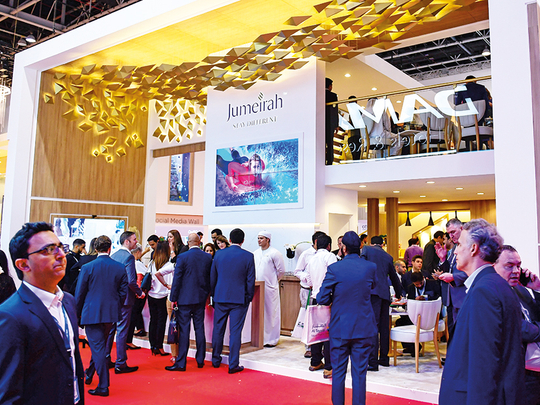
Dubai: For over 21 years, the Jumeirah Group has operated luxury hotels from Dubai to London. Now, for the first time in the company’s history, market pressures have forced Jumeirah to look beyond its traditional five-star resorts to something more youthful, and more dynamic.
Zabeel House, which was first announced in January 2018, is Jumeirah’s foray in to mid-scale, three-star hotels, as Dubai seeks to diversify its tourism strategy in pursuit of 20 million visitors by 2020.
The Dubai government-owned hospitality company behind the Burj Al Arab and the Souq Madinat has said their second brand will focus on experience and adventure, targeting “travellers who want to connect meaningfully with their travel destinations.”
In an exclusive interview with Gulf News at the Arabian Travel Market (ATM) in Dubai last week, general manager and brand architect Alessandro Cabella described the new hotel chain as “upscale casual.”
But what does that really mean?
|
“Upscale casual is all about what counts in the hotel industry these days,” said Cabella, notably “fun, technology, being fresh, and most importantly, the neighbourhood.”
A near 40-year industry veteran, Cabella’s career saw him manage hotels like the Marina Bay Sands in Singapore, and a number of One & Only resorts around the world, before arriving in Dubai to take up a corporate role at Jumeirah’s sister company Meraas, also owned by Dubai Holding.
“We wanted to bring something new to Dubai, and especially bring it to a neglected part of Dubai. Up until now, it’s been all about the Palm, the Marina, and Downtown,” he said.
Strategy
Cabella says that being located in interesting neighbourhoods is critical to Zabeel House’s strategy: “You will not see a Zabeel House on the Palm, or a Zabeel House Downtown, where nothing happens.”
“We’re not targeting five-star luxury travel. We are targeting upscale casual people who enjoy the neighbourhood and want a new experience in a traditional part of town.”
Alessandro Cabella | Area general manager and brand architect for Zabeel House
The Italian’s comments run counter to Jumeirah’s strategy up to this point. The group has placed an emphasis on opening luxury beach resorts tailored towards Western holidaymakers, and typically shied away from city hotels.
“Our target is people who are coming for an experience, travellers that enjoy going a bit off the beaten track,” he said.
The new hotel’s rates are in line with such a demographic: Cabella says that the first property to open, a mini version of Zabeel House with only 150 rooms will charge around Dh350-400, while the other fully-fledge hotels will cost around Dh600 a night.
By way of comparison, one night in the Jumeirah Al Naseem hotel, connected to the Madinat, will cost around Dh3,600.
“We’re not targeting five-star luxury travel. We are targeting upscale casual people who enjoy the neighbourhood and want a new experience in a traditional part of town,” Cabella said.
With hotels set to open in the Greens, a residential community in Dubai, and in Saudi Arabia and London, United Kingdom, Zabeel House has a strong pipeline.
Another affordable, mid-scale hotel brand with an equally aggressive pipeline is Rove, owned by Emaar, the Dubai-based holding company.
Rove, which has opened five hotels throughout Dubai in just over two years, has another three planned.
But Cabella is quick to dismiss the comparison.
“We’re not a Rove. They are located in places like Downtown and the Marina. Their market is different, their rates are different. Their whole thing is different,” he said.
Nevertheless, there are parallels. Both cite technology, and in particular a push towards automated services such as self check-in, as hugely important to the brand’s ethos, while both offer a whimsical, irreverent take on the hotel.
Tapping into a segment
The reception at Zabeel House boasts an assortment of colourful animal sculptures, whilst hashtag slogans and screens adorn the check-in desk at Rove hotels, clearly designed to appeal to younger, social media-savvy travellers.
But the determined push by both Jumeirah and Emaar to branch out in to mid-scale hotels point to something else, too.
“We knew we had the luxury segment covered, and we saw an opportunity to tap in to a segment not yet serviced in the UAE,” Cabella said.
In 2014, His Highness Shaikh Mohammad Bin Rashid Al Maktoum, Vice-President and Prime Minister of the UAE, and Ruler of Dubai, issued a series of directives designed to incentivise, and streamline, mid-scale hotel investment and development in the emirate.
Since then, developers have been increasingly eyeing opportunities outside of the oversupplied luxury market, as Dubai’s tourism authority ramps up its efforts to attract new types of visitors.
But ultimately, Cabella says, Zabeel House makes business sense for Jumeirah.
“I am more than confident that Zabeel House will be a good business addition to Jumeirah’s portfolio. [It’s going to make] money for sure. Our conversion is positive,” he said.
“Jumeirah has been successful in the region, and expanding worldwide, but at the same time Jumeirah needed a new brand. Now, it has one, and we can use that 20 years of experience that Jumeirah has, in to this new upscale casual concept,” he added.










